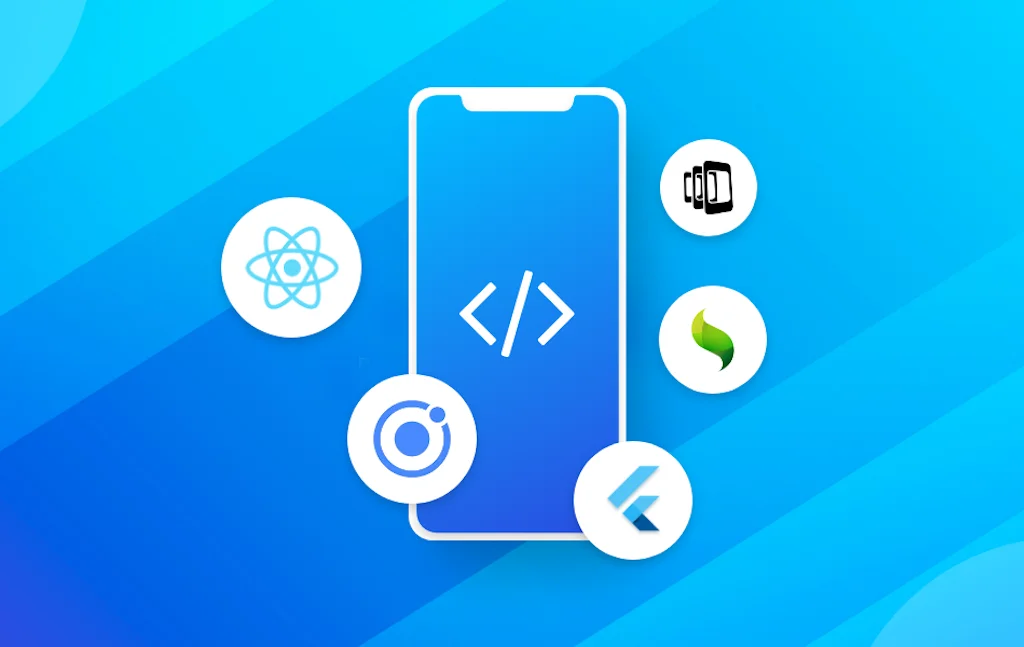Top Cross Platform App Development Frameworks in 2025
- Mobile
- April 1, 2024
Neglecting the virtual world is not an option for any business these days. Prospects are reaching out to the companies through different mediums like web and apps. Currently, mobile apps take the lead in providing this access.
With over 2.47 million apps in the Google play store and 1.8 million apps in the Apple app store, the market is highly saturated. Developers have to work hard to escalate the conversion rate of their apps. A single setback can push the entire app down the drain.
So it’s important to choose the right platform for your app. The native app development gives you more control, but it struggles with native IDEs and SDKs.
Working in cross platform application development, on the other hand, is easier.
Read also: Native vs. Hybrid: A Guide to Mobile App development for Your Business
What is Cross Platform?
Cross platform app development is a programming approach for mobile devices. It is the process of developing mobile apps that can be published on multiple mobile platforms using a single codebase. The apps would fit every platform and function the same across all devices.
These apps are cost-effective and enable access to a broad range of software/hardware. Yet, there are certain restrictions like navigation and control elements that tag along.
Besides the general traits of the cross-platform, there is one thing that makes it different. That is, you need a high-quality and advanced framework to build these apps.
Top Cross Platform App Development Frameworks
In this post, let us scan through a list of five useful cross platform mobile development frameworks to help you design and develop an amazing mobile application:
1. Flutter
Google’s recent sensation Flutter has made cross-platform app development quite convenient. It offers a native-like experience without any compromise on comfort.
Google introduced this SDK in 2018, and to this day, it stands as an efficient tool for mobile app development.

Essentially, Flutter works on Dart language. Yet, without replacing Objective C, Swift, or Java, it supports many other languages in the backend.
Not only that, but using this platform also brings benefits like widgets, foundation libraries, and much more. The interface is easy to use and gives tough competition to React Native in terms of responsiveness and performance.
Read also: Is Flutter Overtaking Native App Development in the Future?
Pros of Flutter
- Clear documentation
- Fast app development
- Compatible with various operating systems
- Impressive widgets
- Receptive frameworks
- A short but positive history
Cons of Flutter
- Not supported on some features
- Some plausible concerns regarding usability are coming up
2. React Native
Developed by Facebook in 2015, React Native stands to be the best alternative for creating captive solutions.
It allows React Native developers to design cross-platform apps with little effort. It gives an experience like native to the final users.

Many professional apps operate through this framework. These include Bloomberg, Facebook, Instagram, and many others. Even though it gives excellent results, this app is not for the beginners. It requires a long time for coding.
React Native has a vast community to support those who get stuck at a dead-end during the design period. They encourage you to proceed and explore the solutions with much vigor.
However, we believe this app can only bring great rewards if you have a team of professionals.
Pros of React Native
- Creates powerful apps
- Plenty of social plugins to show grid pictures, feed, etc.
- Instant assistance available
Cons of React Native
- Beginners can make mistakes
- Stated as unstable by some developers
3. Ionic
Since 2018, Ionic has been the most popular hybrid app framework among the developers.
Designed on top of Angular and Apache Cordova, Ionic offers tools and services for building hybrid apps using technologies like HTML and SaaS.

It is a completely open-source project licensed by MIT. It is free to use and serves a wide customer base across the world. Also, it contains native-styled layouts. Developers prefer it for cross-platform development due to the extensive features and predefined elements.
It has more than 120 native device features. And you can create your apps through Live Reload. That’s because compiling and redeploying your app on every phase of development can be tedious.
The presence of advanced functionalities and customizable tools make it a user-friendly portal. However, these apps rely on wrappers like PhoneGap or Cordova to operate as a native application.
Pros of Ionic
- Free to use
- Performs well on UI
- Has a liver-load system that helps to review your app on devices
- Endorsed by expert developers
Cons of Ionic
- Some versions can be complicated
- Based on Cordova
- Limitations in the free version make the use difficult sometimes
Read also: React Native Vs Ionic: The Battle of Two Cross-Platform App Development Frameworks
4. PhoneGap
The PhoneGap framework by Apache Cordova enables you to work with a single code base but various technologies. It is an open-source tool that designs apps using CSS, HTML, JavaScript, and Web APIs.

The files stay in a local directory or on the cloud. This makes PhoneGap applications highly usable and light-weight. Given the basics, it’s a group of HTML pages covered in a native app shell.
It is one of the most popular frameworks so far. It helps one to craft robust applications enriched with a plethora of features. You can customize the features, and they operate smoothly across all platforms. This way, you can reach a greater audience in very less time.
Pros of PhoneGap
- An enterprise-level platform for integrated market support
- Augmented Reality Cordova plugin
- Native functionality
- Developer friendly
Cons of PhoneGap
- An abundance of graphics can impair performance
- Non-descriptive documentation
5. Sencha
Sencha is an enterprise-oriented product for designing cross-platform mobile-web apps with JavaScript and HTML5. It uses modern web technologies to provide developers with data-intensive design tools.

Its original name was Sencha Touch. It holds a high score against its rivals when it comes to the native look and feels across multiple platforms.
It uses the JavaScript framework Ext JS at the core. This helps to create high-performance apps with native-like experience.
It has themes and tools that facilitate optimization and enhance productivity.
Pros of Sencha
- A library of UI components
- Open-source
- An extensible API
Cons of Sencha
- Performance issues
- Not suitable for individual developers
Top Cross-Platform Mobile App Development Frameworks Comparison
| Feature | Flutter | React Native | Ionic | PhoneGap | Sencha |
| UI | Excellent | Good | Web-based | Webview-based | Rich native-like, |
| Performance | Near-native | Near-native | Hybrid app, slower than native | Webview-based, slowest | Native-like, optimized for offline use |
| Customization | Full access to native platform, custom widgets & animations | Limited native access, leverages React components | Themeable UI components, extendable with plugins | Webview-based, slowest | Extensive UI components & themes, powerful custom logic API |
| Backend Support | Any | Any | Any | Any | JavaScript preferred |
| Development Speed | Fast | Fast | Fast | Medium | Moderate |
| Popular Apps Built | Alibaba, BMW, Nubank | Facebook, Instagram, Airbnb | Uber, BMW, Groupon | Slack, Wikipedia, Deutsche Bahn | Foursquare, BBC Good Food |
Which is Best Cross Platform Mobile Development Framework in 2025?
Whenever you are trying to seek a cross platform app framework for your business, you have to pay particular attention to your target.
Ask yourself, what is it that you need to achieve through your app? Give proper thought to the factors that can impact your app. Following are a few significant elements to consider:
- Company size
- Developers’ expertise
- Required solutions
For example, if you are a small entrepreneur and want to design a simple app, you can use Ionic. And if you are a large firm looking to have a better channel and powerful solutions, Sencha or React Native may be your ultimate solution.
Trends of 2025 reveal that React Native has been performing quite well in the market. It offers solutions for all. The only key is to have an excellent team of professionals for design and maintenance.
Read also: React Native: A Cost-Effective Way for Cross Platform Mobile Apps Development
Certainly, there are going to be costs involved, but over a period of time benefits will outweigh the costs.
Closing Thoughts
There is a wide spectrum of app development frameworks present in the market. You can pick a portal according to the priorities of your developers and their knowledge of the specific framework.
Cross platform app development is, indeed, an apt solution for businesses due to its ease and feasibility. The apps created on this platform are solid and support multiple devices. It lowers the burden of businesses as they have to design a single program only.
I suggest that you must evaluate the market closely before hiring developing experts. Find out if they can meet the requirements and study their work history. Also, having an interaction with them will allow you to see if they can build a relevant app for your business.
FAQs About Cross Platform App Development Frameworks
Cross platform framework is the framework used to develop a mobile application that can run on any device and operating systems like Android and iOS. It empowers the components to write the code once and use it for any platform.
There are many benefits to choose cross platform for your business mobile app like cost-effective development, uniform look and feel across all devices, code re-usability, faster development, wider market reach, and so on.
There are many cross platform app development frameworks available like Flutter, Ionic, React Native, PhoneGap, Xamarin, Appcelerator, Sencha, NativeScript, and many more to list down.
Every cross platform framework has its own charm. You can choose cross platform framework for your mobile app after considering different factors like budget, development time, operating system, etc.













